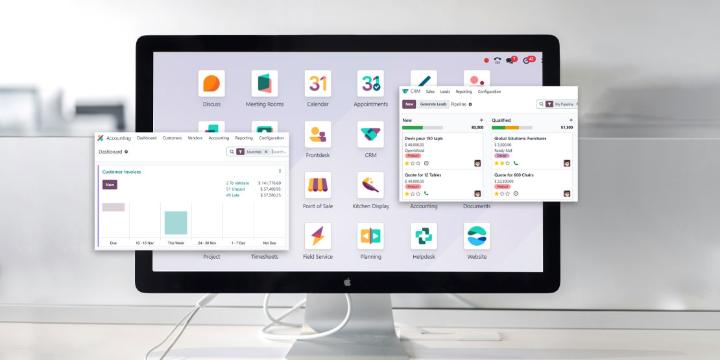Odoo ERP Software: What Makes It Best Open Source ERP Software
Odoo ERP is a well-known name and often considered as the best open-source ERP solutions available today. The software is popular due to its customization capabilities, development flexibility, and seamless integration options. In this blog piece we will know that reasons that makes Odoo stand out from other ERP landscape, and how it can provide maximum productivity to your business with customizable software that target your specific operational needs.
Odoo is an open-source enterprise resource planning (ERP) software that comes with a complete suite of business applications that together can handle all your business functions. The software comes with modules covering sales, CRM, project management, manufacturing, inventory management, accounting, and many more. The software is also an ideal choice for users as it is a holistic approach to business management. Its modular architecture allows businesses to implement only the modules they want and need as per their business also these modules can be expand with the evolving requirements of the business.
Open Source Advantage
Odoo is an open source software, which means the source code of odoo can be accessible to anyone and everyone. The software comes with transparency that allows the businesses to modify their software according to their specific needs without being locked into a vendor's private system. The open-source nature of odoo also fosters a huge community of developers that contribute to the software’s continuous improvement and innovation with the constant market changes.

Customization Capabilities
One of the most amazing feature of odoo is its high degree of customization the level of flexibility is offers that allows the organizations to have customized ERP system which perfectly fit their unique workflows and processes. Here are a few key aspects that depicts the Odoo's customization capabilities:
1. Modular Architecture
Odoo comes with modular structure, where the companies can choose from hundreds of modules that are available in the Odoo Apps Store. Through this methodology each module serves a different purpose but can be tuned independently, for examples there are times when the company needs to have specific functionalities in their inventory management, this is where the modular architecture comes into use as it eliminate the hassle of extra cost and also the burden of compressive training.
2. Custom Module Development
If the business needs are different from any modules available, odoo ERP provides the liberty and the user can develop a customized module. The Organizations can also develop new modules completely that caters all their specific needs and to the users processes it also assist in modifying some of the existing ones which ensure that the implementation of the ERP system fully matches the operations of a business.
3. Customizing User Interface
Odoo provides tools for better user interface customization for making users' work experiences more exciting. Companies can have their personalized dashboards, forms, and reports to fit the way information is regularly presented in the company's operations. This means the users are better positioned to move through the system in an efficient and productive manner.
4. Workflow Customization
Odoo allows companies to implement their customized workflows that illustrate their processes within their operations. For example, if the venture has a specific approval process for purchase orders, then its workflow would be customized in Odoo to validate this requirement. This way, the ERP system supports the process rather than working against the business processes.
5. Reporting and Analytics Customization
With odoo Businesses can have their personalize reports by tracking the metrics that allocate with their business, whether it's sales performance by region or turnover of their inventories. Tailored reporting solutions for businesses by Odoo provides every user with valuable insights into business performance.

Development Flexibility
Apart from customization, some great development flexibility with Odoo is:
1. Support of Programming Language
It is mainly built using Python with the backend and PostgreSQL and JavaScript with the frontend. This composition with the programming languages makes it easier for developers who are familiar with the aspects that are also capable to build custom solutions or modify existing ones through Odoo.
2. Access to API
Odoo provides powerful APIs that enable third-party integrations in a professional way. Businesses make great use of these APIs to integrate the database of their Odoo system with third-party applications like e-commerce platforms, payment gateways, or even customer relationship management (CRM) systems to avoid duplicated work across other used tools.
3. Community Contributions
The active Odoo community contributes a wealth of plugins and modules that extend the functionality of the core software. This community-driven development approach means that businesses can benefit from a wide range of pre-built solutions that can be easily integrated into their existing systems.

Integration Capabilities
Integration is extremely important for any ERP system because it allows different business functions to work together seamlessly. Odoo excels in this area:
1. Third-Party Integrations
Odoo supports integrating into third-party applications with its API and has pre-built connectors. Whether an organization integrates with an e-commerce platform like Shopify or Magento or connects with the payment processors through PayPal or Stripe, Odoo goes along with what best fits an organization's needs.
2. E-commerce Integration
For companies selling online, Odoo integration with e-commerce platforms is essential. It comes with native e-commerce features; Odoo also allows integration with other popular platforms, thus empowering businesses to run their online and traditional sales side by side.
3. CRM Integration
By integrating the functions of CRM into Odoo, the organization is in a better position to handle customer relations. By synchronizing information about the customers between the sales and marketing teams, consistency in communication and, thus, service delivery will be in place.
4. Integration with Supply Chain Management
Supply chain management integration with Odoo involves inventory control and procurement. The system automatically processes orders and monitors shipments, making the whole supply chain more efficient.
Advantages of Using Odoo ERP
The use of Odoo ERP systems can offer the following advantages, which are characterized by customization options, development flexibility, and integration capabilities, among others:
1. Customized Solutions
Organizations can build an ERP solution that fits their requirements rather than changing their processes to fit a rigid software framework because the customization options are vast.
2. Cost-Efficiency
Odoo is an open-source solution that eliminates hefty licensing fees associated with proprietary ERP systems. Such an offering from Odoo provides powerful functionality through customizable modules.
3. Scalability
Odoo's modularity allows organizations to get started in small and add necessary modules as growth or new needs call for it, without needing completely to revamp their system.
4. Higher User Adoption
Customization of user interface and workflows according to user preference improves employee satisfaction, as users would find it easy and more intuitive working within a familiar environment.
5. Continuous Improvement
The active community around Odoo ensures that the software is kept updated with new features and improvements on the basis of user feedback and technological advancements.
Challenges in Customization and Integration
While there are many benefits associated with customizing and integrating Odoo ERP, there are also challenges that organizations should be aware of:
1. Complexity of Customization
Depending on the customization level, the implementation might be difficult and call for developers with experience in the architecture of Odoo.
2. Maintenance Overhead
Custom solutions require continued maintenance and updates if new versions of Odoo are launched or business processes change—this can incur additional overhead costs.
3. Training Requirements
Training employees on using the custom features may be necessary, and though this will take time and resources, it should also be done in order to get the most ROI from the ERP investment.
Frequently Asked Questions
What is the Odoo's customization capabilities?
Odoo comes with modular structure, where the companies can choose from hundreds of modules that are available in the Odoo Apps Store. Through this methodology each module serves a different purpose but can be tuned independently, for examples there are times when the company needs to have specific functionalities in their inventory management, this is where the modular architecture comes into use as it eliminate the hassle of extra cost and also the burden of compressive training. If the business needs are different from any modules available, odoo ERP provides the liberty and the user can develop a customized module. The Organizations can also develop new modules completely that caters all their specific needs and to the users processes it also assist in modifying some of the existing ones which ensure that the implementation of the ERP system fully matches the operations of a business.
What does the Open Source nature of odoo provides
Odoo is an open source software, which means the source code of odoo can be accessible to anyone and everyone. The software comes with transparency that allows the businesses to modify their software according to their specific needs without being locked into a vendor's private system. The open-source nature of odoo also fosters a huge community of developers that contribute to the software’s continuous improvement and innovation with the constant market changes.
What are the biggest advantages of ERP?
Odoo supports integrating into third-party applications with its API and has pre-built connectors. Whether an organization integrates with an e-commerce platform like Shopify or Magento or connects with the payment processors through PayPal or Stripe, Odoo goes along with what best fits an organization's needs.
Read More:
Odoo Development : Ultimate Guide for Tips, and Best Practices